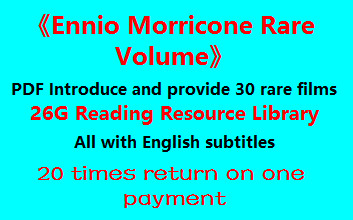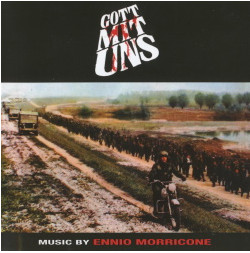GOTT MIT UNS [THE FIFTH DAY OF PEACE] (1969)
Gott Mitt Uns, also known as The Fifth Day of Peace in English or Dio è Con Noi in Italian, is a World War II-era drama directed by Giuliano Montaldo, starring Richard Johnson, Michael Goodliffe, and Bud Spencer. The film is based on the true story of two German soldiers, Bruno Grauber (Franco Nero) and Rainer Schultz (Larry Aubrey), who were executed by their comrades in a Canadian-run prisoner of war camp in Amsterdam in May 1945, after being found guilty of cowardice and desertion by fellow POWs.
To capture the terrible circumstances that Grauber and Schultz found themselves in, Morricone decided to score a lot of Gott Mit Uns with harsh dissonance. A large part of the score – one could easily say too much – features harshly abstract noises, stark string marches, machine gun sound effects, martial drums, and plucked guitars all of which come together in a collision of sound that is difficult to like. Numerous long cues feature this music almost exclusively, including the opening “Titoli di Testa,” and subsequent cues such as “Corsa Disperata,” “Un Cielo Senza Aerei,” “Incarcerati,” “Una Questione Di Principio,” All’Alba Del Quinto Giorno,” and the conclusive “Percussioni e Marcia (Titoli Di Coda)”. I understand what Morricone was doing here, but even with the knowledge of what he was aiming to convey with music, I find myself longing to move past these tracks whenever them come on.
Thankfully, the saving grace of Gott Mit Us is the “Lontano” theme a wistful, faraway theme with a regretful undertone that offers a bittersweet memory of home for the German soldiers at the heart of the story. The theme is written for melancholy strings and a prepared piano, and its two performances in “Versione Disco” and “Versione Film” are the most well-rounded concert arrangement of the it. Later, there is a lovely statement in “Nostalgia di Casa”, while the conclusive “Arrangiamento 1974” Morricone adds guitars and steel drums into the instrumental mix, in an odd but compelling choice. Note: the ‘Versione Disco’ thankfully has nothing to do with 1970s dance craze, and jus differentiates between the album and in-film versions of the cue.
One other cue worth noting is “Prigionieri,” an action sequence wherein Morricone underpins the dissonances with a swirling string ostinato and wandering muted brass. “Erika:” and “La Guerra e Finita!” are raucous drinking songs piece sung in German, while “In Cella” is a cue featuring nothing but a man whistling.
Gott Mit Uns is a difficult score to recommend because so much of it is so unpalatable; so much so, I would even go so far as to just seek out a good version of “Lontano,” because that’s really the only part of the score worth hearing. If you must experience the whole thing, the 2004 CD release from Dagored offers the most comprehensive presentation.
Track Listing: 1. Lontano – Versione Disco (4:26), 2. Gott Mit Uns – Titoli di Testa (1:08), 3. Prigionieri (1:51), 4. Corsa Disperata (1:19), 5. All’erta-Torrette d’Osservazione (0:51), 6. Nostalgia di Casa (1:16), 7. Erika (0:47), 8. Lontano – Versione Film (4:43), 9. Incarcerati (1:39), 10. Il Capitano Miller (0:26), 11. Riunione Degli Ufficiali (1:10), 12. Incarcerati-Secondo (1:39), 13. Un Cielo Senza Aerei (1:32), 14. Corte Marziale (0:46), 15. La Guerra e Finita! (1:06), 16. Discussione Col Generale (0:32), 17. In Cella (0:28), 18. Nostalgia Delle Donne (0:41), 19. Una Questione di Principio (2:45), 20. La Promozione (0:14), 21. La Decisione (0:58), 22. All’Alba del Quinto Giorno (2:11), 23. Percussioni e Marcia – Titoli di Coda (1:58), 24. Lontano – Arrangiamento 1974 (3:48). Dagored RED151-2, 38 minutes 14 seconds.












